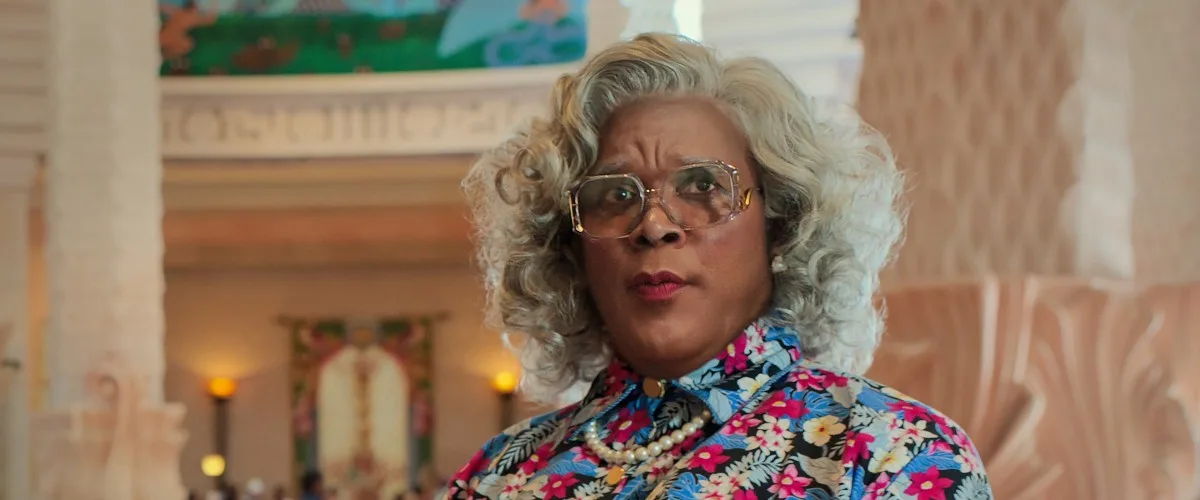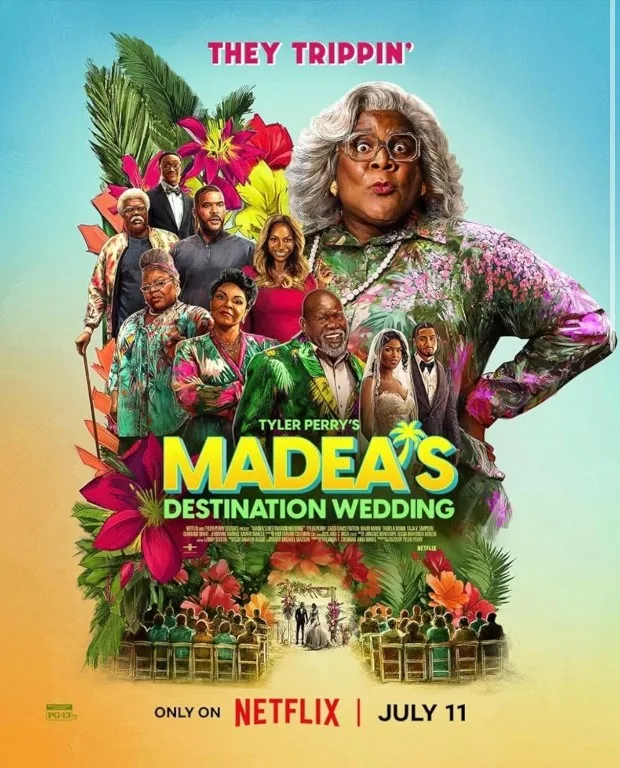Tyler Perry wants to be taken seriously as a filmmaker, so this review of “Madea’s Destination Wedding” will do so. Even though it’s the latest in his series about his most famous character, the combative but goodhearted grandmama Mabel “Madea” Simmons, and is, like nearly all of the rest, fitfully amusing but slovenly and easily forgotten.
In this one, Madea and company head to the Bahamas and get into shenanigans at a luxury hotel. It’s unfortunately typical of Tyler Perry’s comedy output. It runs an hour and forty-five minutes but feels much longer. A strain of misogyny runs through it. It doesn’t introduce any story complications, much less any real stakes for the characters, until more than halfway through its running time. It largely consists of improv-heavy chunks of light clowning; that’s a strange phrasing, admittedly, but what else do you call a scene that doesn’t have anything resembling shape, much less a satisfying payoff?
Perry, as usual, is the credited writer and director in addition to playing multiple characters from Madea’s family, the Simmons, including Madea’s wild-haired, shambling, rascally brother Joe and their earnest son Brian, a prosecutor (played by Perry without special makeup). The story begins with a comedy set piece: Madea, her ex-husband Leroy Brown (David Mann), and their daughter Cora (Tamela Mann) getting accosted at a gas station by would-be robbers, whom Madea bashes into submission with her purse. Then we jump to Joe and his ex-wife Debra (Taja V. Simpson), a former drug addict who cleaned up and married a rich guy, in a fancy restaurant, where they are to be joined by their son B.J. (Jermaine Harris) and daughter Tiffany (Diamond White). Tiffany shows up with a dreadlocked young man named Zavier (Xavier Smalls) who exudes smugness and greets Joe with “Whassup, my n—a?” This is the prospective groom that Tiffany wants her dad to approve of. She’s never mentioned him until this moment.
The destination wedding of the title has already been locked into place by Debra’s rich husband, who is prepared to foot the bill for both the bride and groom’s families. Brian’s pride prevents him from accepting. He’s understandably peeved that Tiffany agreed to this scenario without introducing her man first, and thinks Zavier is a sleazy character. But Brian and other members of the family accept the arrangement and go to the Bahamas to support Tiffany, with Brian putting down a deposit for incidentals.
It takes half the movie for them to get to the Bahamas, check in, look at their rooms, and experience the many splendid areas of the hotel, which include a casino and a huge water slide. The scene where they check in takes several minutes. So does the scene where they figure out the logistics of their lavish suite of rooms. There’s a scene in a gift shop where lots of stuff is added to their bill, and scenes in the casino where Joe gambles and tells the house to add his tally to the bill. You can see where things are going.
There’s a funny, purposefully overwrought sequence where Zavier invites Joe and Leroy to his bachelor party. Joe convinces the pious and clean-living Leroy that it’s a gospel-themed party, practically a church service. Leroy ends up surrounded by scantily clad, twerking dancers, shrieks like a child, and sprinkles them with holy water. Perry is often a hoot playing both Madea and Joe (who twerks very slowly while balancing on his cane). But there’s a lot of flab in the scenes of banter and misunderstanding.
“The Nutty Professor” this ain’t. Little thought has been given to how people end up where they need to be to overhear something they shouldn’t or interfere in a conversation that was supposed to be private. Sometimes people walk up and stand there in plain view while the others remain oblivious to their presence. Farce should be more meticulous than this. It’s like Perry isn’t even trying. Quality control is low even by his hit-and-miss, too-many-movies-a-year standards.
You could say this is disappointing if Perry hadn’t been mostly disappointing for a long time. From the start of his prolific, at times machine-like filmography, there have been times when he seemed to be evolving as an artist—I’m mainly thinking of “For Colored Girls,” “Mea Culpa,” and “A Jazzman’s Blues,” where he was more adventurous with camera placement, editing, and the expressive use of color. “A Jazzman’s Blues,” based on his first screenplay, might be his best movie overall; it certainly has the best final shot: a Georgia man who just learned he’s of mixed-race parentage and that his Black father was lynched, sits down on his white mother’s front porch, and the camera pulls back at such an angle that a Confederate flag above the entrance obscures our view of him. But just when it seems like Perry is about to level up as an artist, he reverts his default, which is half-assing it.
Then there’s the worldview. Perry is deeply religious and fundamentally reactionary in his politics. The plot of this one pivots on a father demanding that a daughter’s fiancé earn his approval lest the marriage not happen. It portrays Tiffany with no personality or, it seems, free will, and Debra as a rich man’s trophy wife who’s trying to execute a secret agenda. And it’s been sprinkled with a little bit of religiosity. So it makes a strange kind of sense that the parts of his films dealing with criminality, addiction, and any type of sex that isn’t plain vanilla are shot more imaginatively than the parts depicting faith and goodness. (A lot of filmmakers—even the great Martin Scorsese, who once wanted to be a priest—are more exciting to watch when they’re depicting bad people.)
But the Perry films praised in this piece are melodramas, which by nature have to be intense and extreme in order to work, and Perry the actor usually doesn’t appear in them, which must free him up to think about how the movie looks. Furthermore, a melodrama can be gripping even if you find its values unrefined or merely outdated. Example: almost any melodrama that was made prior to whatever decade you’re in. The original “Mildred Pierce” is darkly pre-feminist in its portrayal of men and women, but that doesn’t matter, anymore than it matters if the values expressed in an opera or a blues song are retrograde. So really it’s all on Perry to make a great or even very good melodrama, and he hasn’t done that yet. Why? Maybe he just doesn’t want to commit to learning more about film history and technique than he already knows, because if he did, he’d have to make fewer movies.
The comedies that star Perry as the still-wildly popular Madea and various members of her family, are funny junk: collections of messy, overlong sketches with a smidge of narrative binding them together. The movie camera is a tool for artistic expression that has its own language and can speak so eloquently that dialogue is optional; you can see that Perry understands that in his melodramas, which range from pretty good to awful. But there’s no trace of that Perry in the comedies. They seem cobbled together in editing and have no visual personality. Corporate training videos have more style. Perry usually just puts characters in a particular space, arranges them like pins on a clothesline, and lets the cameras run until he’s gathered enough material for the editors to work with.
Comedies like “Madea’s Destination Wedding” do practice a high level of craft, but it mainly has to do with the skill level needed to turn ad-lib heavy acting into something coherent when you’ve got two or more characters played by Perry acting opposite each other in the same scene. There is clearly a bit of compositing involved, but much of it looks like the product of tricks as old as the movie camera itself. I.e., they set up the actors and shoot the scene several times from various angles, making sure to only have one Perry character visible at a time (or putting doubles in the foreground with a wig on). That’s ingenious, in its elemental way. Peter Jackson did something similar in the original Tolkien trilogy, in scenes where big and small characters conversed.
Admittedly, the logistics of filming a Tyler Perry film with Perry performing multiple roles is not what most viewers will be thinking about. But there’s little else to recommend it except for the performances.




















